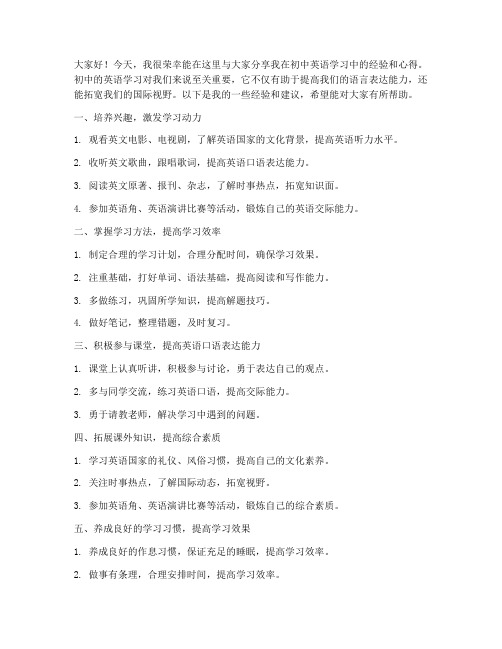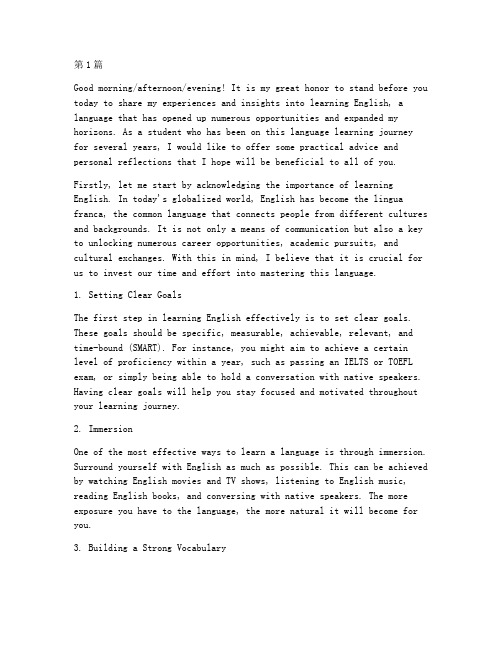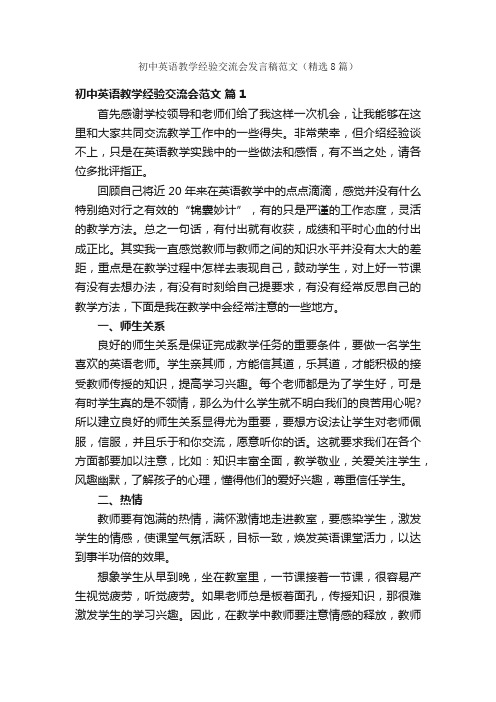八年级英语学习经验交流会发言稿
中学英语经验交流发言稿

大家好!我是XX中学的一名普通学生,很荣幸能在这里与大家分享我的中学英语学习经验。
在过去的几年里,我通过不懈的努力,英语成绩取得了显著的进步。
今天,我想从以下几个方面与大家交流我的学习心得。
一、树立正确的学习态度学习英语是一个长期的过程,需要我们保持良好的学习态度。
首先,我们要明确学习目标,树立远大的理想。
我们要坚信,英语学习不仅仅是为了考试,更是为了拓宽我们的视野,提高我们的综合素质。
其次,我们要热爱英语,把它当作一种乐趣。
在学习过程中,我们要保持积极向上的心态,勇于面对困难,敢于挑战自我。
二、掌握正确的学习方法1. 勤奋背诵单词:单词是英语学习的基础,我们要通过大量的背诵来积累词汇。
在背诵过程中,我们可以运用以下方法:①分类记忆,将单词分为名词、动词、形容词等类别;②联想记忆,将单词与生活中的事物、场景联系起来;③卡片记忆,将单词写在卡片上,随时随地拿出来复习。
2. 语法学习:语法是英语学习的骨架,我们要掌握基本的语法知识。
在课堂上,要认真听讲,做好笔记;课后,要反复练习,巩固所学知识。
同时,我们还可以通过阅读英语文章、观看英语电影等方式,提高语感。
3. 听力训练:听力是英语学习的重要环节,我们要通过多种途径提高听力水平。
①多听英语广播、歌曲、电影等;②参加英语角、口语交流活动;③坚持每天练习听力,如听英语广播、看英语新闻等。
4. 口语表达:口语是英语学习的最终目标,我们要大胆开口说英语。
可以通过以下方式提高口语水平:①参加英语角、口语交流活动;②与外国朋友交流;③模仿英语电影、电视剧中的角色,提高口语表达能力。
三、合理安排学习时间学习英语需要持之以恒,我们要合理安排学习时间。
以下是一些建议:1. 制定学习计划:根据自己的实际情况,制定合理的学习计划,确保每天有足够的时间用于英语学习。
2. 合理安排作息时间:保证充足的睡眠,有利于提高学习效率。
3. 避免拖延:学习英语不能拖延,要充分利用碎片时间,如等车、排队等。
八年级英语学生经验交流发言稿

八年级英语学生经验交流发言稿English Version:Good morning, everyone. It's my honor to share my experiences as an 8th-grade English language learner with you today.When I first started learning English in the 6th grade, I was quite nervous and intimidated. The language seemed so foreign and complex, with unfamiliar vocabulary, grammar structures, and pronunciation rules. I remember feeling overwhelmed and unsure of my abilities.However, as I continued to study and practice, I gradually began to see progress. My teachers were incredibly supportive, providing me with ample opportunities to engage in various learning activities, such as reading comprehension exercises, writing assignments, and conversational practice. They encouraged me to step out of my comfort zone and actively participate in class discussions, which helped me build confidence and improve my communication skills.One of the most valuable lessons I've learned is the importance of persistence and a positive mindset. There were certainly times when I felt discouraged, especially when Iencountered challenging concepts or struggled to express myself accurately. But I learned to embrace mistakes as opportunities for growth and to celebrate even the smallest achievements. Gradually, I began to see English not as a daunting obstacle, but as a fascinating language that opened up a whole new world of possibilities.Another key aspect of my learning experience has been the support of my classmates. In our English classes, we often work in small groups or pairs, which has allowed me to learn from my peers and to contribute my own insights and perspectives. I've found that collaborating with others not only helps me improve my language skills but also fosters a sense of community and mutual understanding.Moreover, I've discovered the joy of exploring English-language media, such as books, movies, and music. By immersing myself in authentic materials, I've been able to deepen my understanding of the language and the cultures it represents. This has not only enhanced my language skills but also broadened my horizons and sparked my curiosity about the world beyond my own.Looking back on my journey as an 8th-grade English language learner, I am truly grateful for the support and guidance I'vereceived from my teachers, the encouragement of my classmates, and the opportunities to engage with the language in meaningful and engaging ways. While the path has not always been easy, the sense of accomplishment and the doors that have opened have made it all worthwhile.As I continue to learn and grow, I am excited to see what the future holds. I know that mastering a new language takes time and dedication, but I am committed to persevering and embracing the challenges that lie ahead. Thank you all for your time and attention.中文版本:各位早上好。
八年级英语学习经验交流会发言稿

八年级英语学习经验交流会发言稿八年级英语学习经验交流会发言稿「篇一」自实施新课程改革以来,全体初三的英语教师以课改为中心,紧紧围绕新课改,不断完善和深化了学科教学常规,组织了课改研究课和专题研讨等系列活动,促进了教师教学观念的转变以及教师整体素质和学科教学质量的提高,为学生获得终身学习能力、创造能力、生存发展能力打下了良好的基础。
一、开展教学研究活动推进学科研究的发展1.抓培训——促新教师专业成长初三英语学科组结合学校的统一安排,充分利用假期时间,集中对教师进行了学科培训,一是针对第一次接受初三毕业班任务的年轻教师,二是针对第一次接触新课改课程的老教师,组织观看录相课、示范课,开展课堂研讨,理清教学思路。
平时,利用每周四下午的业务学习时间进行研究和探讨,同时结合读书活动,阅读有关教育教学理论,记读书笔记,撰写教学札记,教学随笔等,并及时交流评比,为教师的专业成长搭建起了新的交流平台。
2.落实集体备课——实现资源共享英语学科组加强了集体备课制度,做到了备课的“两统一”,“四突出”和“一加强”,即统一研究时间和研究地点;突出重点、难点、课堂设计、学法指导;加强检查和督促力度。
教师根据集体备课内容,写出体现个人教学特色的个案,集体备课的开展与落实,达到了师师之间的共同提高,实现了资源共享。
3.重课堂研究——提高授课艺术课堂教学是课程改革实施的主阵地。
长期以来,我们始终坚持提高课堂教学效益为核心,应用新课程标准的理念,全面推进课程改革。
我们重点采取了以下方式:(1)以课例为载体,提高课堂教学水平。
每学期通过“说——评——改”(说课活动),“讲——议——改”(备课组听评课活动),“学——思——改”(校级观摩课活动)等形式,组织学科教师听课、评课,反思自己的教学,整改课堂教学。
(2)发挥英语学科骨干教师的作用。
每学期我们借助于本学科骨干教师多这一优势,安排两次泰安市教学能手,泰安市优质课一等奖获得者等骨干老师讲示范课,听课教师进一步研讨分析示范课的教学思路,对照自己的教学写反思,以调整以后的教学。
初中英语经验交流发言稿

大家好!今天,我很荣幸能在这里与大家分享我在初中英语学习中的经验和心得。
初中的英语学习对我们来说至关重要,它不仅有助于提高我们的语言表达能力,还能拓宽我们的国际视野。
以下是我的一些经验和建议,希望能对大家有所帮助。
一、培养兴趣,激发学习动力1. 观看英文电影、电视剧,了解英语国家的文化背景,提高英语听力水平。
2. 收听英文歌曲,跟唱歌词,提高英语口语表达能力。
3. 阅读英文原著、报刊、杂志,了解时事热点,拓宽知识面。
4. 参加英语角、英语演讲比赛等活动,锻炼自己的英语交际能力。
二、掌握学习方法,提高学习效率1. 制定合理的学习计划,合理分配时间,确保学习效果。
2. 注重基础,打好单词、语法基础,提高阅读和写作能力。
3. 多做练习,巩固所学知识,提高解题技巧。
4. 做好笔记,整理错题,及时复习。
三、积极参与课堂,提高英语口语表达能力1. 课堂上认真听讲,积极参与讨论,勇于表达自己的观点。
2. 多与同学交流,练习英语口语,提高交际能力。
3. 勇于请教老师,解决学习中遇到的问题。
四、拓展课外知识,提高综合素质1. 学习英语国家的礼仪、风俗习惯,提高自己的文化素养。
2. 关注时事热点,了解国际动态,拓宽视野。
3. 参加英语角、英语演讲比赛等活动,锻炼自己的综合素质。
五、养成良好的学习习惯,提高学习效果1. 养成良好的作息习惯,保证充足的睡眠,提高学习效率。
2. 做事有条理,合理安排时间,提高学习效率。
3. 保持积极的心态,面对困难不气馁,勇往直前。
总之,初中英语学习是一个循序渐进的过程,需要我们付出努力和耐心。
以下是我对大家的一些建议:1. 坚持不懈,相信自己,相信英语学习之路一定会越走越宽广。
2. 学会感恩,感谢老师的辛勤付出,感谢同学的陪伴与支持。
3. 保持自信,相信自己有能力学好英语,实现自己的梦想。
最后,祝愿大家在初中英语学习中取得优异的成绩,为我国的外交事业贡献自己的力量!谢谢大家!。
英语经验交流学生发言稿(3篇)

第1篇Good morning/afternoon/evening! It is my great honor to stand before you today to share my experiences and insights into learning English, a language that has opened up numerous opportunities and expanded my horizons. As a student who has been on this language learning journeyfor several years, I would like to offer some practical advice and personal reflections that I hope will be beneficial to all of you.Firstly, let me start by acknowledging the importance of learning English. In today's globalized world, English has become the lingua franca, the common language that connects people from different cultures and backgrounds. It is not only a means of communication but also a key to unlocking numerous career opportunities, academic pursuits, and cultural exchanges. With this in mind, I believe that it is crucial for us to invest our time and effort into mastering this language.1. Setting Clear GoalsThe first step in learning English effectively is to set clear goals. These goals should be specific, measurable, achievable, relevant, and time-bound (SMART). For instance, you might aim to achieve a certain level of proficiency within a year, such as passing an IELTS or TOEFL exam, or simply being able to hold a conversation with native speakers. Having clear goals will help you stay focused and motivated throughout your learning journey.2. ImmersionOne of the most effective ways to learn a language is through immersion. Surround yourself with English as much as possible. This can be achieved by watching English movies and TV shows, listening to English music, reading English books, and conversing with native speakers. The more exposure you have to the language, the more natural it will become for you.3. Building a Strong VocabularyA strong vocabulary is the foundation of effective communication in any language. Make it a habit to learn new words every day, and try to incorporate them into your daily conversations and writings. Use flashcards, vocabulary apps, and even write down new words in a notebook to reinforce your memory. Additionally, try to learn collocations, which are words that commonly go together, as this will help you speak and write more fluently.4. Grammar and PronunciationGrammar and pronunciation are two essential components of English proficiency. Invest time in understanding the basics of grammar, such as tenses, sentence structures, and parts of speech. As for pronunciation, practice listening to native speakers and try to mimic their accent and intonation. You can also record yourself speaking and compare it to the native speakers' recordings to identify areas for improvement.5. Engage in Conversational PracticeConversational practice is crucial for mastering a language. Find language exchange partners or join language clubs to practice speaking with others. Do not be afraid to make mistakes; they are a natural part of the learning process. The more you practice, the more confident you will become in your conversational abilities.6. Utilize TechnologyIn this digital age, technology can be a powerful tool in your language learning journey. There are numerous online resources, such as language learning apps, websites, and forums, that can help you supplement your studies. Additionally, consider using a language learning software or an online tutor to tailor your learning experience to your specific needs.7. Stay Patient and PersistentLearning a language is a gradual process that requires patience and persistence. Do not get discouraged by setbacks or slow progress. Remember that every bit of effort you put into learning English will contribute to your overall proficiency.8. Reflect and AdjustRegularly reflect on your learning process and make adjustments as needed. Assess your strengths and weaknesses, and focus on areas that require improvement. Set new goals based on your progress and continue to challenge yourself.In conclusion, learning English can be a challenging but rewarding experience. By setting clear goals, immersing yourself in the language, building a strong vocabulary, mastering grammar and pronunciation, engaging in conversational practice, utilizing technology, staying patient and persistent, and reflecting on your progress, you will be well on your way to achieving your language learning goals.Thank you for your attention, and I wish you all the best on your English learning journey. Let us continue to support and inspire each other as we strive to become proficient speakers and users of this beautiful language.Thank you.第2篇Good morning/afternoon! It is a great honor to stand before you today to share my experiences and insights into learning English. As a student who has been on a journey to master this beautiful language, I have encountered numerous challenges and rewards along the way. I hope that my experiences can inspire and guide others who are also striving to improve their English skills.Title: My Journey to English MasteryIntroduction:My name is [Your Name], and I am a [Your Current Level of Study – e.g., senior in high school]. My journey with English began when I was in elementary school, and it has been a continuous and challenging process. Today, I would like to share some of the key strategies, resources, and experiences that have helped me in my English learning journey.1. Embracing the Language:The first step in learning any language is to embrace it wholeheartedly. For me, this meant immersing myself in English as much as possible. I started by watching English movies with subtitles, listening to English music, and reading books in English. These activities not only helped me get familiar with the language but also sparked my interest in it.2. Building a Strong Foundation:A solid foundation is crucial for language learning. I focused on mastering the basics of grammar, vocabulary, and pronunciation. I took regular grammar lessons, used vocabulary apps, and practiced speaking with native speakers to improve my pronunciation. It was challenging at first, but with persistence, I gradually saw improvements.3. Utilizing Various Resources:There are numerous resources available to help learners improve their English skills. I made the most of these resources to enhance my learning. Here are some of the tools I found helpful:a. Textbooks and Workbooks: These are essential for structured learning. I used textbooks for grammar and vocabulary and workbooks for exercises and practice.b. Online Platforms: Websites like Duolingo, BBC Learning English, and Coursera offer interactive lessons and courses that cater to different levels of learners.c. Language Exchange Apps: Apps like Tandem and HelloTalk allow you to connect with native speakers and practice speaking through text, voice, and video chats.d. Podcasts and Audiobooks: Listening to podcasts and audiobooks helps improve listening skills and exposes you to different accents and speaking styles.4. Engaging in Conversational Practice:One of the most effective ways to improve your English is by engaging in conversations. I joined language clubs at school, participated in English-speaking groups, and even traveled to English-speaking countries to practice my speaking skills. These experiences helped me build confidence and improve my fluency.5. Setting Realistic Goals:Setting achievable goals is essential to keep you motivated and focused.I set short-term and long-term goals for myself, such as learning a new word every day, reading a book in English every month, and participating in an English-speaking competition.6. Overcoming Challenges:Learning a new language is not without its challenges. I faceddifficulties such as frustration with pronunciation, fear of making mistakes, and lack of motivation. However, I overcame these challenges by seeking help from teachers, joining support groups, and reminding myself of the reasons why I wanted to learn English.7. Reflecting and Adapting:As I progressed in my language learning journey, I reflected on my experiences and made necessary adjustments. I realized that what worked for me in the beginning might not work as effectively later on. Therefore, I was open to trying new methods and resources to keep my learning dynamic and engaging.Conclusion:In conclusion, my journey to English mastery has been a blend of hard work, determination, and continuous learning. By embracing the language, building a strong foundation, utilizing various resources, engaging in conversational practice, setting realistic goals, overcoming challenges, and reflecting on my experiences, I have been able to improve my English skills significantly.I believe that every student has the potential to achieve their language learning goals. It is important to be patient, persistent, and open tonew experiences. As you embark on your own English learning journey, remember that success is a result of continuous effort and dedication.Thank you for listening to my experiences. I hope my words have inspired you to take the first step towards mastering English and to enjoy the journey as much as I have.[Your Name]第3篇Good morning/afternoon/evening! It is a great pleasure to stand before you today to share my experiences and insights on learning English, a language that has become an integral part of my life. As a student who has been studying English for several years, I have gathered a wealth of knowledge and practical skills that I would like to pass on to my fellow learners. So, let's embark on this journey of discovery and exchange.First and foremost, I want to emphasize the importance of setting clear goals. When I first started learning English, I was motivated by the desire to communicate effectively with native speakers and to explore the world beyond my own language. It is crucial to define your objectives and understand why you want to learn the language. Whetherit's for academic purposes, career advancement, or personal fulfillment, having a clear goal will keep you motivated and focused.One of the most effective ways to improve your English is through reading. I have always believed that reading is the key to language mastery. It not only exposes you to new vocabulary and sentence structures but also helps you understand the nuances of the language. I recommend starting with simple books and gradually moving to more complex materials. Additionally, reading a variety of genres, such as novels, newspapers, and scientific articles, can broaden your understanding of the language and culture.Listening is another essential skill that requires constant practice. I found that listening to English podcasts, watching movies and TV shows, and listening to music in English were great ways to immerse myself in the language. It is important to listen to different accents anddialects, as this will help you adapt to various speaking styles. Moreover, try to listen actively by taking notes, summarizing the content, and discussing it with others. This will enhance your comprehension and retention of the language.Writing is often overlooked, but it is a fundamental skill that can greatly improve your English. I started by keeping a daily journal in English, which helped me practice my grammar and vocabulary. Writing essays, articles, and even short stories can also be beneficial. It is essential to proofread and edit your work, as this will help youidentify and correct your mistakes. Remember, writing is a skill that improves with practice, so don't be afraid to make mistakes and learn from them.Speaking, of course, is the ultimate goal of language learning. I found that joining language exchange groups, participating in debate clubs, and attending English-speaking events were excellent opportunities to practice my speaking skills. It is important to speak as much as possible, even if it feels uncomfortable at first. Try to find a language partner or join a conversation class, where you can practice with others. Don't worry about making mistakes; what matters most isthat you are trying to communicate and improving your fluency.Another crucial aspect of learning English is to embrace the language and culture. I have always been fascinated by the English-speaking world and its diverse cultures. By immersing myself in the culture, I have been able to understand the language better and appreciate its nuances. Follow English-speaking influencers on social media, watch English movies and TV shows, and explore the music scene. This will not only make your language learning journey more enjoyable but also help you connect with people from different backgrounds.Moreover, I want to share some tips that have helped me along the way:1. Be consistent: Language learning requires regular practice, so try to set aside time each day to study and practice English.2. Be patient: Improvement takes time, so don't get discouraged if you don't see immediate results.3. Stay positive: Maintain a positive attitude and believe in your abilities. Confidence is key to success.4. Utilize technology: There are numerous language learning apps and online resources that can help you improve your English.5. Seek feedback: Don't hesitate to ask for help from teachers, mentors, or language partners. Constructive criticism is invaluable.In conclusion, learning English has been a transformative experience for me. It has opened up new opportunities, enriched my life, and allowed me to connect with people from all over the world. I hope that my experiences and advice will inspire and motivate you to pursue your language learning journey with enthusiasm and determination.Thank you for your attention, and I wish you all the best in your English language learning endeavors.[Your Name]。
初中英语教学经验交流会发言稿范文(精选8篇)

初中英语教学经验交流会发言稿范文(精选8篇)初中英语教学经验交流会范文篇1首先感谢学校领导和老师们给了我这样一次机会,让我能够在这里和大家共同交流教学工作中的一些得失。
非常荣幸,但介绍经验谈不上,只是在英语教学实践中的一些做法和感悟,有不当之处,请各位多批评指正。
回顾自己将近20年来在英语教学中的点点滴滴,感觉并没有什么特别绝对行之有效的“锦囊妙计”,有的只是严谨的工作态度,灵活的教学方法。
总之一句话,有付出就有收获,成绩和平时心血的付出成正比。
其实我一直感觉教师与教师之间的知识水平并没有太大的差距,重点是在教学过程中怎样去表现自己,鼓动学生,对上好一节课有没有去想办法,有没有时刻给自己提要求,有没有经常反思自己的教学方法,下面是我在教学中会经常注意的一些地方。
一、师生关系良好的师生关系是保证完成教学任务的重要条件,要做一名学生喜欢的英语老师。
学生亲其师,方能信其道,乐其道,才能积极的接受教师传授的知识,提高学习兴趣。
每个老师都是为了学生好,可是有时学生真的是不领情,那么为什么学生就不明白我们的良苦用心呢?所以建立良好的师生关系显得尤为重要,要想方设法让学生对老师佩服,信服,并且乐于和你交流,愿意听你的话。
这就要求我们在各个方面都要加以注意,比如:知识丰富全面,教学敬业,关爱关注学生,风趣幽默,了解孩子的心理,懂得他们的爱好兴趣,尊重信任学生。
二、热情教师要有饱满的热情,满怀激情地走进教室,要感染学生,激发学生的情感,使课堂气氛活跃,目标一致,焕发英语课堂活力,以达到事半功倍的效果。
想象学生从早到晚,坐在教室里,一节课接着一节课,很容易产生视觉疲劳,听觉疲劳。
如果老师总是板着面孔,传授知识,那很难激发学生的学习兴趣。
因此,在教学中教师要注意情感的释放,教师走进课堂就应该象演员走进摄影棚,立刻进入角色,动作神态逼真传神,富于激情,用自己的教学热情去激发起学生的相应情感体验,以富有表现力的面部表情,恰当自然的形态动作给学生深刻的感染,加速激活认知能力。
八年级英语学习经验交流会发言稿

八年级英语学习经验交流会发言稿尊敬的老师和同学们:大家好!我很荣幸能够站在这里和大家分享我八年级英语学习的经验和收获。
在八年级的英语学习中,我有幸遇到了一位非常优秀的英语老师。
正是她的教诲和悉心指导,让我在英语学习上有了很大的进步。
她不仅生动有趣地上课,还鼓励我们积极参与课堂互动,提高听说能力。
她还常常给我们推荐一些外语电影、英语原著小说和歌曲,这让我更加喜欢英语,也提高了我的阅读和听力能力。
在学习方法方面,我认为坚持多做练习很重要。
通过练习,我可以巩固课上学到的知识,提高语法和词汇的运用能力。
同时,我也会找一些适合自己的学习材料进行阅读,比如英语报纸、杂志和简单的英文小说。
通过阅读,不仅能够扩大词汇量,还可以提高理解能力和阅读速度。
另外,积极参加英语角、英语演讲比赛等活动也对提高英语水平很有帮助。
在这些活动中,我可以与志同道合的同学共同学习,互相交流,提高口语表达能力和自信心。
同时,这些活动也为我提供了一个展示自己的机会,让我更有动力去努力学习和提高。
最后,我还想强调一个重要的学习秘诀,那就是养成学习英语的习惯。
每天坚持一点点学习,保持学习的连贯性,可以让我们更好地积累知识,不断提高。
还有就是要树立正确的学习态度,英语学习是需要耐心和毅力的过程,只有保持积极的心态,才能战胜困难,取得好成绩。
在这八年级的英语学习中,我收获了很多,不仅提高了英语能力,还培养了良好的学习习惯和自信心。
我相信,只要我们坚持不懈,用心去学,我们一定可以在英语学习的道路上越走越远。
谢谢大家!。
学英语的经验发言稿初中怎么写范文

学习英语的经验发言稿篇
大家好,今天我很荣幸可以来分享我的学习英语的经验。
英语是一门世界语言,掌握好英语对我们的未来发展至关重要。
下面我将分享一些我在初中时学习英语的经验和方法。
首先,要建立良好的学习习惯。
每天都要抽出一定的时间来学习英语,坚持不
懈地学习是很重要的。
比如,可以每天晚上抽出半个小时来背单词,每天早上花一些时间听英语歌曲或者新闻,多听多说对提高英语听力和口语能力是很有帮助的。
其次,要充分利用各种学习资源。
除了老师讲授的知识,还可以利用网络资源
来拓展自己的英语知识。
可以在网上找一些英语学习网站或者APP,比如英语课程、英语听力练习等,这样可以更好地巩固和提高自己的英语水平。
另外,多参加英语学习活动也是提高英语水平的好方法。
可以参加学校组织的
英语角活动、英语演讲比赛等,这样可以锻炼自己的口语表达能力,提高自信心。
还可以和同学们一起组织英语学习小组,互相学习、互相交流,这样可以更快地提高英语水平。
最后,要保持乐观的心态。
学习英语是一个长期的过程,会遇到各种困难和挫折,但是只要坚持下去,一定会取得进步。
要相信自己,相信自己的能力,勇敢地面对挑战,相信只要努力,一定能学好英语。
总之,学习英语是一个持之以恒的过程,需要不断地学习和努力。
希望大家都
能在学习英语的路上取得成功,感谢大家听我分享我的经验,谢谢!。
- 1、下载文档前请自行甄别文档内容的完整性,平台不提供额外的编辑、内容补充、找答案等附加服务。
- 2、"仅部分预览"的文档,不可在线预览部分如存在完整性等问题,可反馈申请退款(可完整预览的文档不适用该条件!)。
- 3、如文档侵犯您的权益,请联系客服反馈,我们会尽快为您处理(人工客服工作时间:9:00-18:30)。
八年级英语学习经验交流会发言稿
尊敬的各位领导、老师们、同学们,
大家好!很高兴在这里和大家一起探讨有关英语学习的问题。
八年级的英语老师中高手很多,我相信每个老师都有自己一套行之有效的教学方法,在这里我只就我自己的一些个人体会,对同学们谈一些学习英语应该注意的方面。
要学好英语,我认为应该注意如下几点:
第一,端正学习态度。
不想学习的人永远学不会。
有些同学不是学不会,而是不想学。
天上不会掉馅饼,只有付出才可能有收获。
看看你周围的同学,哪一个学习优秀的同学不是把学习当成自己最大的事啊。
没有端正的学习态度,所有的方法都是空谈,老师再讲得如何天花乱坠,如果听不到耳朵去,也是白费。
第二,克服畏难情绪。
相信自己,别人能学会,自己通过努力照样能学会。
同学们身边有这样的例子,小学时英语学不会,到了初中,跟着老师一点点学,照样考到了九十多分一百多分。
谁也不是天生就是学英语的料,谁的英语知识也是一点一滴积累起来的。
她能你也能,只要一点点地跟着老师的思路走,按照老师说得去做,你每天也会进步。
第三,坚持很重要。
只有三天的热情是不够的,下定决心要做的事一定要坚持。
第四,讲究学习方法。
1.学习单词时,读是第一位的,先会读再练写。
读单词根据音标读单词比较容易,节省时间。
音标是拐杖,学会了用音标拼单词,只要老师简单给你纠正一下个别不准确的读音,你就可以用自己掌握的音标知识很容易地读出单词了,就像学会了汉语拼音,你就会读新华字典上的所有单词一样。
再注意,读单词时,一定要读得滚瓜烂熟,这样就为后边的写打下了基础。
2.写单词时根据读音拼写单词比较省劲。
根据读音分节记,很长的'一个单词,化成几个音节,很快就记住了,这就是化繁为简。
3.懂得遗忘规律。
有的同学认为自己永远记不住单词,并说,瞬间记住单词不难,难得是过一会儿就忘了。
说得很好,不忘才不正常,你问问你们班英语考最高分的同学,单词记住一次永远不忘吗?遗忘是最正常的事,所以反复记忆很重要。
第一天记住了第二天再记,第三天再记,有时间再和单词见个面,总是见面就熟了,印象深了,忘不了了。
有科学研究发现,一般一个单词反复记七遍后就不容易忘了。
4.词不离句。
新学的生词在课本中的哪句话中出现的,背过这句话,不但记住了单词,而且单词的使用也没问题了,因
为只记住一些零散的单词考试时是帮不上什么大忙的,试卷上的每道题都是以句子的形式出现的,记句子才是最聪明的做法。
这样养成习惯后,连写小作文都不成问题。
5.笔记要做好,老师举的例子也要写好,而且要有背笔记的习惯。
你翻开以前自己做不上的那些自认为很难的那些题,往往是老师讲过的知识点自己没记住而不知所措。
6.课本比做题重要,掌握好课本才能以不变应万变。
单词反复背写,对话课文背熟写过。
这是最最有用的。
做题前先把课本中的东西复习一下,再做题很轻松很自信。
7.翻看错题很重要。
就是以前的好题集锦本,我上学时就是自发地弄错题本,厚厚的塑料皮本子,所列错题一直带着,没事时翻翻,尤其考试前翻翻,很有效果。
总之,英语要多听,多读,多写,多背,简单的事情做绝了,那就是本事。
好了,我就说这些,最后祝同学们的英语都学得棒棒的!。
